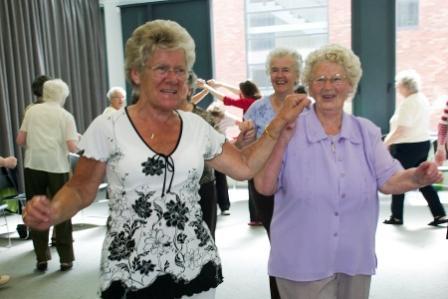Making 'good society' requires radical change

On April 23, the Carnegie UK Trust launched a new report into the creation of a 'good society'; their findings suggest radical change is needed.
In one particular episode of The Simpsons, Homer exclaims jubilantly to his long suffering wife: "Hey Marge! Look at me, I'm reading the Economist! Did you know Indonesia is at a crossroads?" Today, you don't need to read the Economist to realise Ireland is at a crossroads or, as Peter Cassells called it, a "turning point".
(Pictured: North Clondalkin CDP protest)
Cassells, the former head of the ICTU, was chairing the launch of Carnegie UK's report 'Making Good Society', the result of three years work by the Commission of Inquiry into the Future of Civil Society (CIFCS) in the UK and Ireland. The aim of the document is to give ideas as to the correct path to take on that crossroads, and it looks at all levels of society; from the creation of a civil economy, the democratisation of our media, the transformation to a low carbon economy and the development of participatory and deliberative democracy.
"Civil society is on the cusp of a remarkable change," said James Dorley, a commissioner with the CIFCS. "It's full potential has yet to be realised." Dorley spoke of the need to "manage our economy differently" to make it "fairer and more sustainable", and cited the past decade in Ireland as a failure as it delivered "profit for the few with no social gain".
Speaking on the need to tackle climate change, Dorley said: "Neither the state nor the market can meet the challenge [of climate change]...we need societal change." John Gibbons, journalist, environmentalist and founder of the website thinkorswim.ie, agreed. "Meeting today's needs does not give us the right to take away from future generations," said Gibbons. He called the debate against climate change "bogus", and was highly critical of the media for its "powerful and growing anti-environmental stance".
Indeed, the failures of the media in modern society are well highlighted in the report. Seamus McAleavey, also a commissioner for the CIFCS, said that the media was "settled on the one track" and needed more "transparency and accountability". "Ordinary people have begun to buy into [the media consensus]," said McAleavey. "Dissent has become marginalised...you need organisations out there saying the awkward things to promote change."
Much of the report's proposals were dependent upon the creating of an active citizenry; a citizenry that would be interested and involved in the issues and in change. Dr. Maureen Gaffney, a writer and columnist who is a psychologist by profession, said that to create an active citzenry real leadership was needed.
"There is a weakened sense of citizenship in Ireland," said Gaffney. She said people power was an "illusion" and that "nothing happens unless it is through institutions and organisations". Without the correct leadership, she said, Irish people will not engage with those institutions. Who that leadership would comprise was uncertain; no politicians, for example, were in attendance at the launch. The fundamental issue of how to tackle public apathy and engage Ireland's citizenry was not addressed fully by the report, and it remains the major challenge faced on the path towards making that 'good society'.
Some specific recommendations of the report include:
- Making the economy more open and pluralist and welcoming innovation, whether financial or social
- Making institutional owners, such as pension funds, more accountable to their savers
- Measuring an economy's success not by short term growth or financial gains, but in terms of the sustainable well-being of current and future generations
- Investing in a local low carbon economy
- Motivating civil society's interest in environmentalism and sustainability, beyond the green movement
- The formation of citizen conventions to shape consensus for action
- Growing local and community news media
- Protection of the free, open and democratic nature of the internet
- Strengthening very local democracy and refashioning parliaments
- Investing in deliberational skills from an early age and developing leaders from all backgrounds
However, there were criticisms from the audience regarding the inquiry, particularly from the Community Workers Co-op. Their representative said that they were "a section of society that wasn't invited to the party in the first place" and said that, while the ideas put forward by the report were good, many groups and institutions didn't have the means or the contacts needed to make their voices heard in the corridors of power. Ethnic groups also said that they felt outside the loop as regards public discourse in Ireland, and for a 'good society' to be created stronger integration policies were needed.
Dorley concluded the launch by saying that the report was a "cookbook"; it provided recipes, not all of which would necessarily be liked. However, the primary aim of the document is to engender discussion and interest in the future of Irish civil society. Given the structural deficits that are in place - under resourced media, underfunded community groups, a parliament that people are disillusioned with and a trade union movement that is seen as having 'sold out' - it remains to be seen how it will achieve that goal on a countrywide scale. For those who do engage and read this report, there are compelling arguments in favour of the need for fundamental structural change in Ireland.
The full text of the report can be viewed on the Carnegie UK Trust's website.
